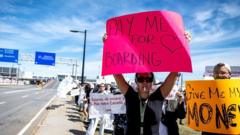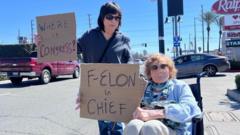Philadelphia, PA — In a significant development for municipal operations, the American Federation of State, County and Municipal Employees District Council 33 (AFSCME DC 33), which represents around 9,000 public workers, announced that a tentative labor agreement was reached with Philadelphia's mayor, Cherelle Parker, early Wednesday, marking the end of an eight-day strike that had greatly impacted city services.
The strike, which commenced on July 1, 2025, forced the city to reduce public services, including closing libraries and extending repair response times for critical infrastructure. Most noticeably, the city grappled with heaps of uncollected garbage that surged during the work stoppage, creating unsightly vistas and unpleasant odors across Philadelphia, the nation's sixth-largest city. In response to the deteriorating sanitation conditions, the city resorted to hiring private contractors alongside non-union municipal workers, a strategy met with heavy criticism for its efficacy.
In the newly brokered agreement, union members are set to receive a 14% wage increase over the next four years, coinciding with Mayor Parker's tenure. The contract still requires ratification by union members, who had previously been split regarding the city's wage proposals, which some argued did not align with rising inflation.
This labor dispute was particularly significant as it represented the first extensive strike by the union in almost four decades, reflecting broader concerns among municipal workers about their compensation and working conditions in an era of increasing living costs. Mayor Parker expressed her relief in a social media post, stating her gratitude to the city’s workers and citizens for their patience during the strike and emphasizing the importance of the agreement for both parties moving forward.
While this tentative deal may bring temporary relief, it raises broader questions about the sustainability of public worker wages in light of rising expenses and the economic climate in Philadelphia. Observers will be keenly watching how the union’s members react during the ratification process in the coming days, as well as how this agreement shapes future labor negotiations.
The strike, which commenced on July 1, 2025, forced the city to reduce public services, including closing libraries and extending repair response times for critical infrastructure. Most noticeably, the city grappled with heaps of uncollected garbage that surged during the work stoppage, creating unsightly vistas and unpleasant odors across Philadelphia, the nation's sixth-largest city. In response to the deteriorating sanitation conditions, the city resorted to hiring private contractors alongside non-union municipal workers, a strategy met with heavy criticism for its efficacy.
In the newly brokered agreement, union members are set to receive a 14% wage increase over the next four years, coinciding with Mayor Parker's tenure. The contract still requires ratification by union members, who had previously been split regarding the city's wage proposals, which some argued did not align with rising inflation.
This labor dispute was particularly significant as it represented the first extensive strike by the union in almost four decades, reflecting broader concerns among municipal workers about their compensation and working conditions in an era of increasing living costs. Mayor Parker expressed her relief in a social media post, stating her gratitude to the city’s workers and citizens for their patience during the strike and emphasizing the importance of the agreement for both parties moving forward.
While this tentative deal may bring temporary relief, it raises broader questions about the sustainability of public worker wages in light of rising expenses and the economic climate in Philadelphia. Observers will be keenly watching how the union’s members react during the ratification process in the coming days, as well as how this agreement shapes future labor negotiations.





















